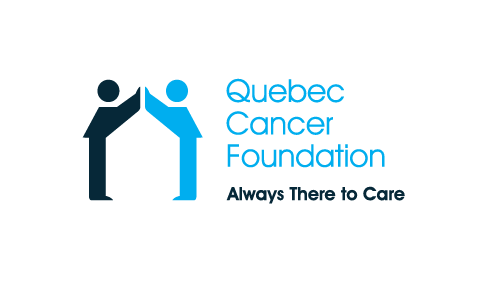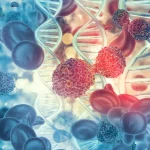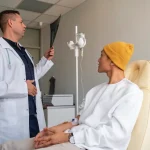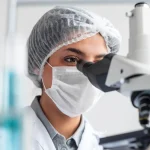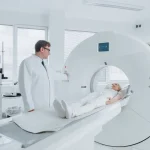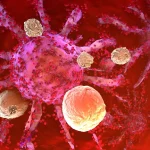Hormone therapy for prostate cancer
Prostate cancer cells are hormone-dependent.
This means that their growth is influenced by the presence of the male hormones known as androgens. Androgens are hormones that are responsible for the development of masculine physical characteristics, such as the voice breaking and the appearance of facial and body hair at puberty. The main androgens are testosterone and dihydrotestosterone (DHT). They are produced by the testes under the influence of LHRH secreted by the hypothalamus.
Hormonal therapy for prostate cancer aims at blocking the action of these hormones. It is also called androgen deprivation therapy or anti-androgen therapy or chemical or surgical castration. It is mainly used to treat advanced, recurrent or aggressive (“high-grade”) prostate cancer.
Objectives of hormone therapy
- To reduce the size of the tumor prior to radiotherapy (neoadjuvant treatment);
- To improve the effectiveness of treatment during radiotherapy;
- To reduce the risk of cancer progression following radiotherapy or surgery (adjuvant treatment);
- To relieve pain or decrease symptoms of advanced prostate cancer (palliative treatment).
The oncologist first assesses the overall health of the person, as well as the type, stage and grade of the cancer and his PSA (Prostate Specific Antigen) level (PSA is an enzyme produced by the prostate gland). He then decides whether hormone therapy is indicated and what form it should take.
Hormone therapy is effective in slowing the growth of prostate cancer, but does not cure it. The length of its effectiveness varies greatly from person to person. Among the men who take it, 70-85% respond well to treatment for periods varying from 1 to over 10 years.
Hormone therapy can be administered continuously (without interruption) or intermittently (periodically).
Indications for intermittent hormone therapy
- Delaying onset of resistance to hormone therapy (hormone resistance);
- Improving tolerance to treatment;
This method of administering hormone therapy makes it possible to stop the treatment after a variable period of time or as soon as the PSA level drops sufficiently. When PSA levels rise again, the hormone therapy is resumed and can be stopped again temporarily if PSA normalizes. This leads to better tolerance to treatment and a better quality of life.
Advantages of hormone therapy
- Although it is not a cure, it is a recognized, effective treatment for prostate cancer;
- It acts on prostate cancer wherever it occurs in the body (metastases);
- It can be administered in combination with other treatments to make them more effective;
- It can lessen some of the symptoms of advanced prostate cancer.
Disadvantages of hormone therapy
- May cause side effects affecting quality of life;
- Some side effects are permanent;
- Its effectiveness is of limited duration and varies according to the patient (resistance to hormone therapy).
Types of treatment
There are three main types of hormone therapy for prostate cancer:
- Injections or implants to block the production of testosterone (chemical castration);
- Tablets to block the effects of testosterone;
- Surgery to remove the testicles (surgical castration).
The most frequently used types of hormone therapy
- Androgen deprivation with luteinizing hormone-releasing hormone (LHRH) analogs or antagonists;
- Anti-androgens;
- Surgery.
Androgen deprivation with luteinizing hormone-releasing hormone (LHRH) analogs or antagonists
LHRH is a hormone produced by the hypothalamus at the base of the brain. This hormone controls the secretion of sex hormones. LHRH analogs (or agonists) and antagonists are drugs designed to block the production of testosterone by the testes (chemical castration) by acting on the production of LHRH. Decreased testosterone levels slow the growth of prostate cancer cells.
The most frequently used LHRH analogs are:
- Leuprolide (Lupron, Lupron Depot, Eligard);
- Goserelin (Zoladex);
- Triptorelin (Trelstar);
- Buserelin (Suprefact).
These drugs are given by regular injections administered at variable intervals depending on the drug chosen. For example, the injection can be given once a month, or every 3, 4 or 6 months. The treatment can be given continuously or intermittently.
The LHRH antagonist used to treat prostate cancer is Degarelix (Firmagon). It is given by injection once a month.
Blood samples are usually prescribed to monitor testosterone levels. This ensures that hormone suppression is effective.
The anti-androgens
Anti-androgens stop the production of androgens or block their action. They bind to androgen receptors on prostate cancer cells and prevent them from using testosterone to grow.
Anti-androgens are generally not used alone to treat prostate cancer. As the primary treatment for prostate cancer, they may be combined with surgical castration or an LHRH (combined androgen blockade) antagonist.
They are also often combined with LHRH agonists or analogs for a short period of time to mitigate a temporary tumor outbreak reaction to these drugs at the outset of administration.
Anti-androgens can be taken orally in tablet or liquid form.
- As the sole treatment (rarely) (metastatic prostate cancer);
- As part of a combined treatment prior to starting injections or implants;
- As part of a combined treatment at the same time as injections or implants;
- After surgery to remove the testicles (surgical castration).
The most common types are:
- Bicalutamide (Casodex);
- Flutamide (Euflex);
- Cyproterone Acetate (Androcur);
- Nilutamide (Anandron);
- Abiasterone Acetate (Zytiga) combined with Prednisone;
- Enzalutamide (Xtandi).
Surgery
Surgical hormone treatment for prostate cancer consists of removing the testicles. It is sometimes called surgical castration. Removing the testicles decreases the amount of testosterone in the body, which reduces the progression of most prostate cancers.
It is a radical treatment since testosterone concentration can drop by 90 to 95%. This procedure is performed as day surgery under regional anesthesia.
Two techniques can be used:
- Pulpectomy: preserves the external wall of the testicles;
- Orchiectomy: the entire testicle is removed.
Sources :
Hormone therapy
Hormonal therapy for prostate cancer
Hormone Therapy for Prostate Cancer
